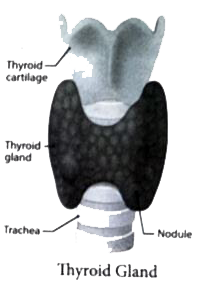With a neat labelled diagram, explain the pituitary gland and the types of hormones. Solution in Tamil

The thyroid gland is composed of two distinct lobes lying one on either side of the trachea. The two lobes are connected by means of a narrow band of tissue called as the isthmus. This gland is composed of glandular follicles and lined by cuboidal epithelium.The follicles are filled with colloid material called thyroglobulin. An amino acid tyrosine and iodine are involved in the formation of thyroid hormone. The hormones secreted by the thyroid gland are (a) Triiodothyronine (T3)
(b) Tetraiodothyronine or Thyroxine (T4)
Functions of Thyroid hormone:
(a) Production of energy by maintaining the Basal Metabolic Rate (BMR) of the body.
(b) Helps to maintain normal body temperature. (c) Influences the activity of Central Nervous System. (d) Controls growth of the body and bone formation. (e) Essential for normal physical, mental and personality development. So it is called personality hormone. (f ) Regulatescell metabolism.
When the thyroid gland fails to secrete the normal level of hormone, the condition is called thyroid dysfunction. It leads to the following conditions: (1) Hypothyroidism: It is caused due to the decreased secretion of the thyroid hormones. (a) Goitre: Goitre is caused due to the inadequate supply of iodine in our diet. It leads to the enlargement of thyroid gland, protruded, marked swelling in the neck and is called goitre. (b) Cretinism: It is caused due to decreased secretion of thyroid hormone in children. The conditions are stunted growth, mental defect, lack of skeletal development and deformed bones. They are called as cretins. (c) Myxoedema: It is caused by deficiency of thyroid hormone in adults. They are mentally sluggish, increase in body weight, puffiness of the face, hand etc. (2) Hyperthyroidism: It is caused due to the excess secretion of the thyroid hormone, which leads to Grave.s disease. The symptoms are protrusion of the eyeballs (Exopthalmia), increased metabolic rate, high body temperature, sweating, loss of body weight and nervousness.
Topper's Solved these Questions
- BOOK - FULL MARKSCHAPTER - PLANT AND ANIMAL HORMONESEXERCISE - ADDITIONAL QUESTIONS (DRAW LABELLED DIAGRAM)3videos
PLANT AND ANIMAL HORMONES
- BOOK - FULL MARKSCHAPTER - PLANT ANATOMY AND PLANT PHYSIOLOGY EXERCISE - ADDITIONAL QUESTIONS (HIGHER ORDER THINKING SKILLS (HOTS))4videos
PLANT ANATOMY AND PLANT PHYSIOLOGY
- BOOK - FULL MARKSCHAPTER - REPRODUCTION IN PLANTS AND ANIMALS EXERCISE - Additional Questions (IX. Answer the following in detail. Draw diagrams wherever necessary:)8videos
REPRODUCTION IN PLANTS AND ANIMALS
Similar Questions
Draw a labelled diagram for the Hormonal interaction in plant growth and development.
View SolutionWhat are non-green plants? Give an example.
03:00View SolutionWith the help of a neat labelled diagram, explain, how does fertilization take place in flowering plants.
03:36View SolutionWith a neat labelled diagram of the structure, explain formation of a p-type semiconductor.
05:51View SolutionWith a neat labelled diagram, explain how a rainbow is formed.
04:07View SolutionDraw neat labelled diagrams : Type of lenses.
03:33View SolutionExplain myopia or short sighteness with a neat labelled diagram
04:47View Solutionwith a neat labelled diagram, explain phloem tissue.
04:35View SolutionExplain the structure of mitochondria with a neat labelled diagram.
05:55View SolutionWith a neat labelled diagram, explain phloem tissue.
02:08View SolutionWith a neat labelled diagram, explain the pituitary gland and the types of hormones.
03:08View SolutionExplain the components of a biogas plant with a neat labeled diagram.
04:32View SolutionDraw neat and labelled diagram: Human endocrine glands
03:18View SolutionDraw neat and labelled diagrams of the following: Types of RNA
04:58View SolutionDescribe parathyroid glands with the help of neat labelled diagram.
07:13View Solution
